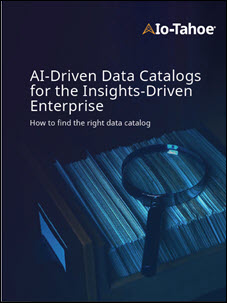There’s no doubt about it. The commoditization of data has opened a world of opportunities up for countless enterprises. But, many businesses are now in a race to analyze and find new value to their expanding data to stay competitive in their respective markets. And as big data explodes, metadata initiatives are failing, and data discovery and retrieval is getting more and more difficult. A new white paper from IO-Tahoe explores data catalogs as a potential answer to this challenge.

“Data lakes have turned into data swamps. Metadata initiatives have derailed,” the report states. “As a result, data discovery and retrieval are ongoing, head-banging challenges.”
On top of the obvious challenges, new regulations such as the European Union’s (EU) General Data Protection Regulation (GDPR) and the California Consumer Privacy Act (CCPA) are magnifying the risks for data management.
IO-Tahoe contends new tactics are needed to mitigate these challenges. Enter data catalogs, which are quickly becoming popular as a workable solution. This report from Io-Tahoe outlines some of the major considerations to help enterprises find the best AI-driven data catalogs that will work best for their organizations.
A recent Gartner report notes, “Data catalogs are the new black in data management and analytics,” says that “through 2019, 80% of data lakes will not include effective metadata management capabilities, making them inefficient.”
When evaluating data catalog products, the white paper asserts you need to keep an eye out for solutions that us AI and/or machine learning.
“Today’s data stores are simply too large for humans to view and manually organize. It doesn’t help that data is constantly flowing in from — and out to — suppliers, partners, and customers.” — IO-Tahoe
Automation can help solve these challenges, but machine learning and AI can greatly improve automated metadata outcomes. Of the new technologies available to companies today, IO-Tahoe explained that automated machine learning and data management and natural language processing are essential to content cataloging.
That said, AI and machine learning with no human input has it’s pitfalls, since the systems often struggle to pick out nuances in content.
“Teaming humans with artificial intelligence in data cataloging combines the speed and scale of artificial intelligence with the precision of human knowledge and experience,” the report states.
Ultimately, if properly managed, data does not have to remain “in a swamp.”
AI-driven data catalogs can help companies get a firm handle on what data they have, where it exists, and how it can be effectively used, according to IO-Tahoe.
Download the new report, courtesy of IO-Tahoe, “AI-Driven Data Catalogs for the Insights-Driven Enterprise: How to find the right data catalog,” to find out how AI-driven data catalogs can work to help your company mitigate its data challenges.





Speak Your Mind